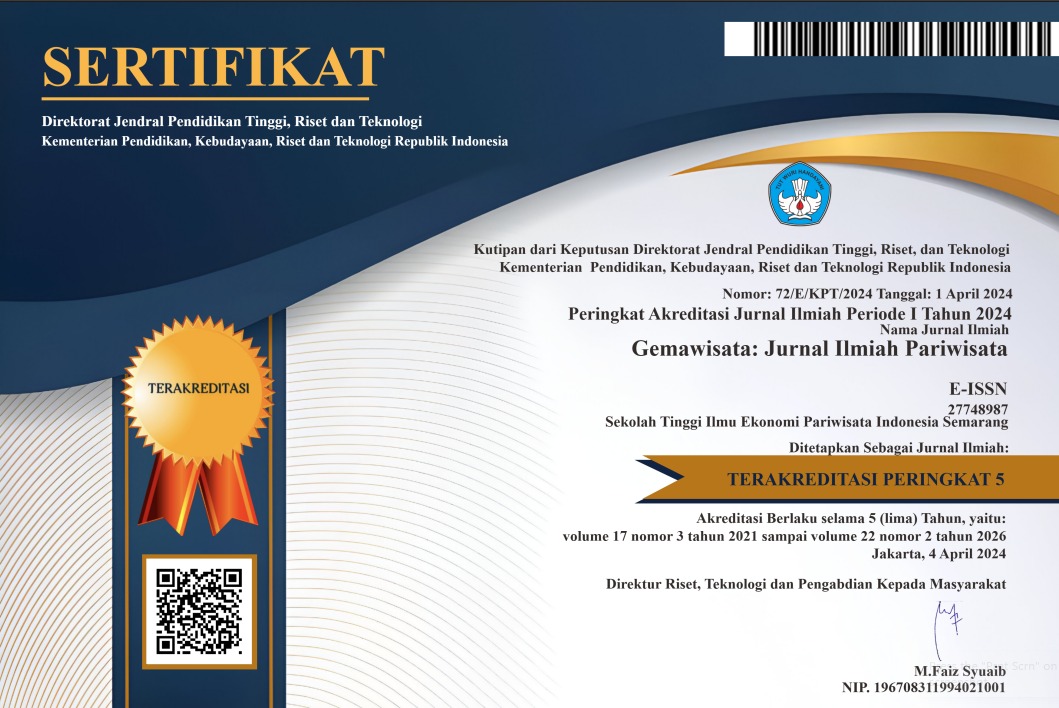Marathon Event sebagai Strategi Efektif dalam Meningkatkan Daya Tarik Destinasi
DOI:
https://doi.org/10.56910/gemawisata.v21i2.690Keywords:
sport tourism, sport event, marathon event, destination, tourist visitAbstract
This study examines marathon events as an effective strategy for enhancing destination appeal in the context of sport tourism development. As tourism trends shift toward active and health-conscious lifestyles, marathon events have emerged as inclusive platforms that integrate physical activity with cultural and natural attractions. This research uses a qualitative descriptive method with a case study approach, combining literature analysis and in-depth interviews with participants. The findings show that marathon events significantly influence tourist engagement, increase length of stay, and stimulate local economic activity through increased accommodation, culinary consumption, and attraction visits. Furthermore, these events promote destination visibility through digital and social media engagement. However, challenges remain, including environmental risks, infrastructure limitations, regulatory constraints, and accessibility for persons with disabilities. The study concludes that marathon events, when managed sustainably and inclusively, can enhance a destination’s brand identity and competitiveness. It suggests the need for integrated planning involving local governments, tourism stakeholders, and community participation to ensure that marathon events contribute positively to long-term destination development.
References
Chen, G., Deng, T., & W. Z. (2023). City marathon events and tourism industry: A quasi-natural experiment. Journal of Sport Economics, 24(7), 851–876.
Confederation of Tourism & Hospitality. (2011). Special interest tourism: Study guide. Singapore.
Dari, S. W., Prabowo, A., & Raibowo, S. (2022). Potensi perkembangan pariwisata olahraga (sport tourism) di Kecamatan Enggano, Kabupaten Bengkulu Utara, Provinsi Bengkulu. SPORT GYMNASTICS: Jurnal Ilmiah Pendidikan Jasmani, 3(2), 288–300. https://doi.org/10.33369/gymnastics.v3i2.21548
Deery, M., Jago, L., & Fredline, L. (2004). Sport tourism or event tourism: Are they one and the same? Journal of Sport and Tourism, 9(3), 235–245. https://doi.org/10.1080/1477508042000320250
Ferdian, M. E. (2023). Analysis of the implementation of the Jakarta Marathon as a sports tourism event for the DKI Jakarta province. Management Analysis Journal, 12(1), 102–125.
Findley, A., Sharma, G., Bentley, S., Arbuckle, R., Patalanov, F., Naujoks, C., Kommineni, J., Tyagi, N., Lehane, A., Wolffsohn, J. S., & Chiva-Razavi, S. (2023). Comparison of literature review, social media listening, and qualitative interview research methods in generating patient-reported symptom and functional impact concepts of presbyopia. Ophthalmology and Therapy, 12(1), 501–516. https://doi.org/10.1007/s40123-022-00620-w
Guan, Z., & Zhang, L. (2024). The study for the analysis of the development trend of sports tourism. Academic Journal of Sciences and Technology, 9(1), 263–265. https://doi.org/10.54097/43a49551
Insanaputra, Y. S. (2024). Pengaruh event olahraga dalam menaikkan pertumbuhan ekonomi pariwisata khususnya penginapan di sekitar Prambanan (Studi kasus: Event Jogja Mandiri Marathon 2024 terhadap tempat penginapan di area Prambanan). Pringgitan, 5, 65–75.
Julian, M. V., & Berutu, F. (2024). Analisis event sport tourism speedcubing dalam meningkatkan kunjungan wisatawan di Jakarta (Studi kasus: Indonesian Championship 2022). JIIP - Jurnal Ilmiah Ilmu Pendidikan, 7(8), 8799–8805. https://doi.org/10.54371/jiip.v7i8.5109
Koba, Y. (2020). Internet marketing communication in event tourism promotion. In The Emerald Handbook of ICT in Tourism and Hospitality (pp. 149–164).
Mantu, Y. (2019). Peluang potensi wisata olahraga dalam meningkatkan kunjungan wisatawan. Journal of SPORT (Sport, Physical Education, Organization, Recreation, and Training), 3(2), 70–78. https://doi.org/10.37058/sport.v3i2.982
Masrurun, Z. Z. (2020). Kajian strategi pengembangan pariwisata olahraga paralayang di Kabupaten Wonosobo. Pariwisata, 1(1), 1–11.
Mokoginta, R. A., Poluan, R. J., & Lakat, R. M. (2020). Pengembangan kawasan wisata bahari (Studi: Kecamatan Nuangan Kabupaten Bolaang Mongondow Timur). Spasial, 7(3), 325–334.
Perić, M., & Slavić, N. (2019). Event sport tourism business models: The case of trail running. Sport, Business and Management: An International Journal, 9(2), 164–184. https://doi.org/10.1108/SBM-05-2018-0039
Permatasari, D. N. C. (2022). Strategi peningkatan brand awareness dan aktivitas promosi dalam sport event (Studi kasus: Event Maybank Bali Marathon 2019, Gianyar, Bali). Jurnal Kepariwisataan, 21(1), 1–18. https://doi.org/10.52352/jpar.v21i1.697
Rangkuti, Y. A., Setyawati, H., Hartono, M., & Hidayah, T. (2024). New model of sports tourism with sustainable tourism development to increase tourist arrivals in Central Aceh Regency, Indonesia. Frontiers in Sports and Active Living, 6(July), 1–14. https://doi.org/10.3389/fsport.2024.1421363
Sanchez-Padilla, R., Valverde, Á. C., Rabanaque, T. V., & Escámez Marsilla, J. I. (2024). Tourists with intellectual disabilities: Analysis of their first-hand experiences. Tourism, 72(2), 173–188. https://doi.org/10.37741/t.72.2.4
Saputra, I. P. D. A. (2023). Pemanfaatan digital marketing dalam mempromosikan destinasi pariwisata. AL-MIKRAJ: Jurnal Studi Islam dan Humaniora, 4(1), 345–353. https://doi.org/10.37680/almikraj.v4i1.3621
Susanto, P. C., Yuntina, L., Saribanon, E., & Soehaditama, J. P. (2024). Qualitative method concepts: Literature review, focus group discussion, ethnography and grounded theory. Siber Journal of Advanced Multidisciplinary, 2(2), 262–275.
Yun, S., Kim, K., Lee, S., & Kim, Y. H. (2024). Another market segment: Sport event tourism by disabled athletes. BMC Sports Science, Medicine and Rehabilitation, 16(1), 1–12. https://doi.org/10.1186/s13102-024-00914-5


1_(1).jpg)






